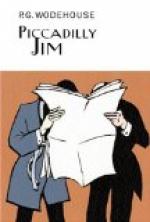“Dafternoon,” said Miss Trimble, and Mrs. Pett backed convulsively into the padded recesses of her chair, feeling as if somebody had thrown a brick at her.
“Good afternoon,” she said faintly.
“Gladda meecher, siz Pett. Mr. Sturge semme up. Said y’ad job f’r me. Came here squick scould.”
“I beg your pardon?”
“Squick scould. Got slow taxi.”
“Oh, yes.”
Miss Trimble’s right eye flashed about the room like a searchlight, but she kept the other hypnotically on her companion’s face.
“Whass trouble?” The right eye rested for a moment on a magnificent Corot over the mantelpiece, and she snifted again. “Not s’prised y’have trouble. All rich people ‘ve trouble. Noth’ t’do with their time ’cept get ’nto trouble.”
She frowned disapprovingly at a Canaletto.
“You—ah—appear to dislike the rich,” said Mrs. Pett, as nearly in her grand manner as she could contrive.
Miss Trimble bowled over the grand manner as if it had been a small fowl and she an automobile. She rolled over it and squashed it flat.
“Hate ’em! Sogelist!”
“I beg your pardon,” said Mrs. Pett humbly. This woman was beginning to oppress her to an almost unbelievable extent.
“Sogelist! No use f’r idle rich. Ev’ read B’nard Shaw? Huh? Or Upton Sinclair? Uh? Read’m. Make y’think a bit. Well, y’haven’t told me whasser trouble.”
Mrs. Pett was by this time heartily regretting the impulse which had caused her to telephone to Mr. Sturgis. In a career which had had more than its share of detectives, both real and fictitious, she had never been confronted with a detective like this. The galling thing was that she was helpless. After all, one engaged a detective for his or her shrewdness and efficiency, not for suavity and polish. A detective who hurls speech at you through clenched teeth and yet detects is better value for the money than one who, though an ideal companion for the drawing-room, is incompetent: and Mrs. Pett, like most other people, subconsciously held the view that the ruder a person is the more efficient he must be. It is but rarely that any one is found who is not dazzled by the glamour of incivility. She crushed down her resentment at her visitor’s tone, and tried to concentrate her mind on the fact that this was a business matter and that what she wanted was results rather than fair words. She found it easier to do this when looking at the other’s face. It was a capable face. Not beautiful, perhaps, but full of promise of action. Miss Trimble having ceased temporarily to speak, her mouth was in repose, and when her mouth was in repose it looked more efficient than anything else of its size in existence.
“I want you,” said Mrs. Pett, “to come here and watch some men—”
“Men! Thought so! Wh’ there’s trouble, always men’t bottom’f it!”
“You do not like men?”




